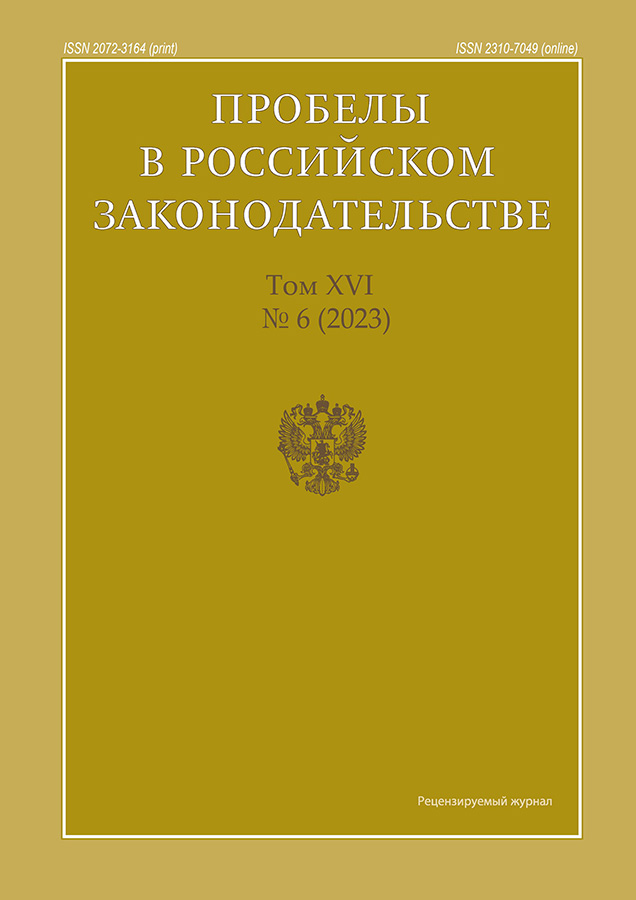Правовое регулирование систем искусственного интеллекта в международном частном праве
- Авторы: Пакшин П.К.1
-
Учреждения:
- Национальный исследовательский университет «Высшая школа экономики» Министерство цифрового развития, связи и массовых коммуникаций Российской Федерации
- Выпуск: Том 16, № 6 (2023)
- Страницы: 99-105
- Раздел: Частно-правовые (цивилистические) науки
- URL: https://journals.eco-vector.com/2072-3164/article/view/623581
- DOI: https://doi.org/10.33693/2072-3164-2023-16-6-099-105
- EDN: https://elibrary.ru/LHAHFI
- ID: 623581
Цитировать
Аннотация
В данной статье был проведён анализ попыток правового регулирования искусственного интеллекта в международном частном праве. Автор отмечает, что проблема взаимодействия искусственного интеллекта и права с каждым десятилетием становится всё более актуальной, а отдельного внимания при этом заслуживает тот факт, что в российском законодательстве отсутствует решение вопроса о правовом признании действий систем искусственного интеллекта. Автор обращает внимание на предпосылки возникновения искусственного интеллекта, изучает особенности его регулирования в международном частном праве, аспекты функционирования и пределы его применимости, а также юридической ответственности. Автор приходит к выводу о необходимости использовать гибкий подход, в котором объём ответственности, первоначально возложенный на создателей системы искусственного интеллекта, постепенно смещается с создателей на сами системы. Автор обращает внимание на то, что применение систем искусственного интеллекта представляется перспективным в сфере гармонизации и унификации норм международного частного права, а также контроля соблюдения этических принципов сторонами в международном арбитраже. По вопросу охраноспособности полученных с помощью искусственного интеллекта произведений автор полагает, что системы искусственного интеллекта представляется возможным признавать только лишь в качестве «фактического автора», а автором полученного объекта «с точки зрения права» должен являться человек. При этом применение концепции «коллективного субъекта» к «электронному лицу» представляет собой соотнесение правосубъектности искусственного интеллекта с правосубъектностью юридического лица и является наиболее конкретным и простым в реализации.
Полный текст
Об авторах
Павел Константинович Пакшин
Национальный исследовательский университет «Высшая школа экономики» Министерство цифрового развития, связи и массовых коммуникаций Российской Федерации
Автор, ответственный за переписку.
Email: ppk-center@mail.ru
SPIN-код: 6333-2450
Scopus Author ID: 1137475
эксперт Дирекции по научным проектам, главный специалист-эксперт отдела развития технологий искусственного интеллекта Департамента развития искусственного интеллекта и больших данных
Россия, Москва; МоскваСписок литературы
- Василевская Л.Ю. Цифровизация гражданского оборота: проблемы и тенденции развития (цивилистическое исследование). Москва : Проспект, 2022. Т. I. 288 с.
- Выходец Р.С. Политика стран ЕАЭС в области искусственного интеллекта // Евразийская интеграция: экономика, право, политика. 2022. Т. 16. № 3. С. 106–117.
- Крысанова Н.В. К вопросу о правосубъектности и правовом развитии искусственного интеллекта // Социальные и гуманитарные науки. Отечественная и зарубежная Литература
- . Серия 4, Государство и право : Реферативный журнал. 2021. C. 23–31.
- Филипова И.А. Искусственный интеллект в системе трудовых отношений с учетом концепции служебного произведения // Право интеллектуальной собственности. 2020. № 1 (59). С. 21–25.
- Хисамова З.И., Бегишев И.Р. Сущность искусственного интеллекта и проблема определения правосубъектности // Вестник МГОУ. Серия: Юриспруденция. 2020. № 2. С. 96–106.
- Шахназаров Б.А. Правовое регулирование отношений с использованием искусственного интеллекта // Актуальные проблемы российского права. 2022. № 9 (142). С. 63–72.
Дополнительные файлы









